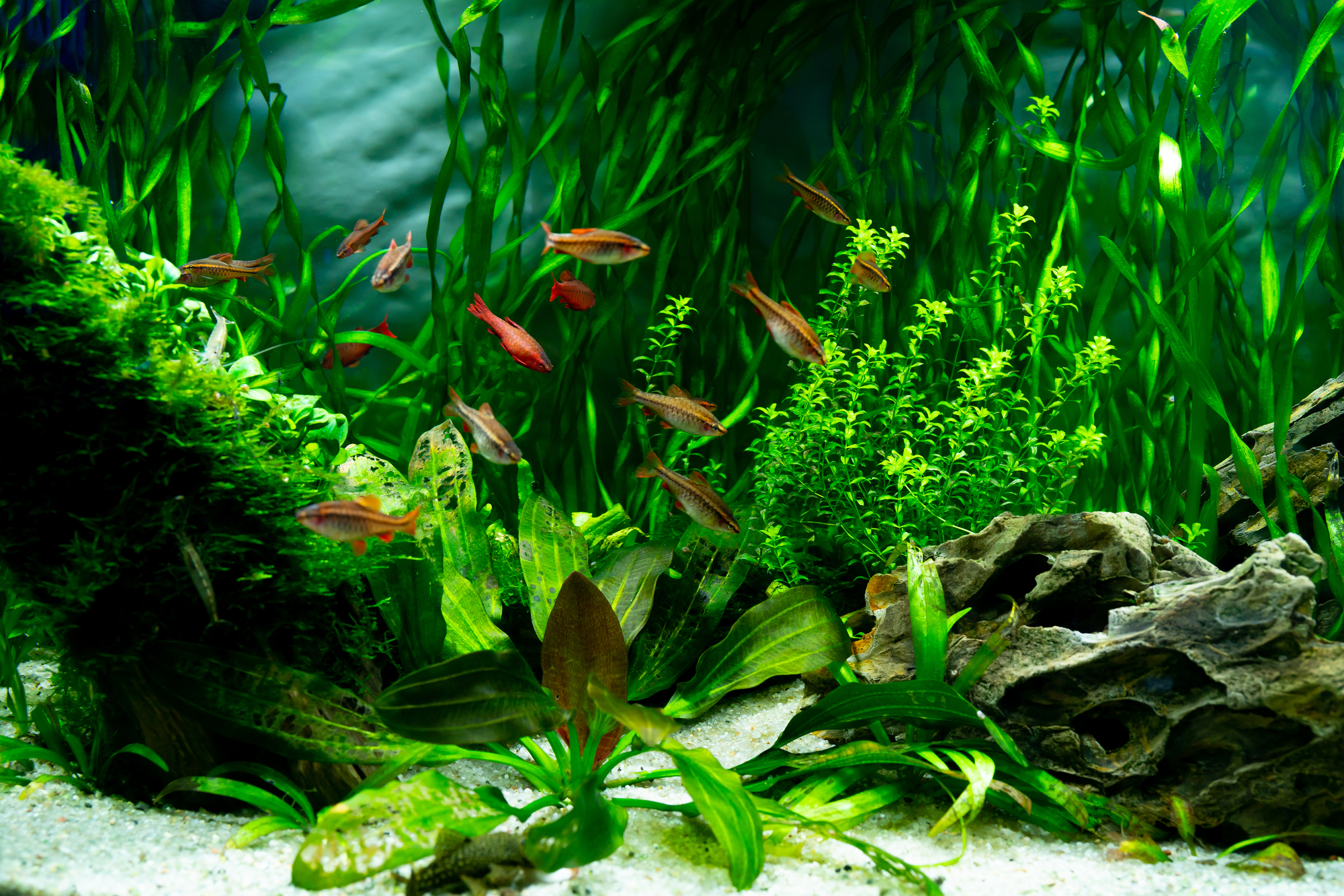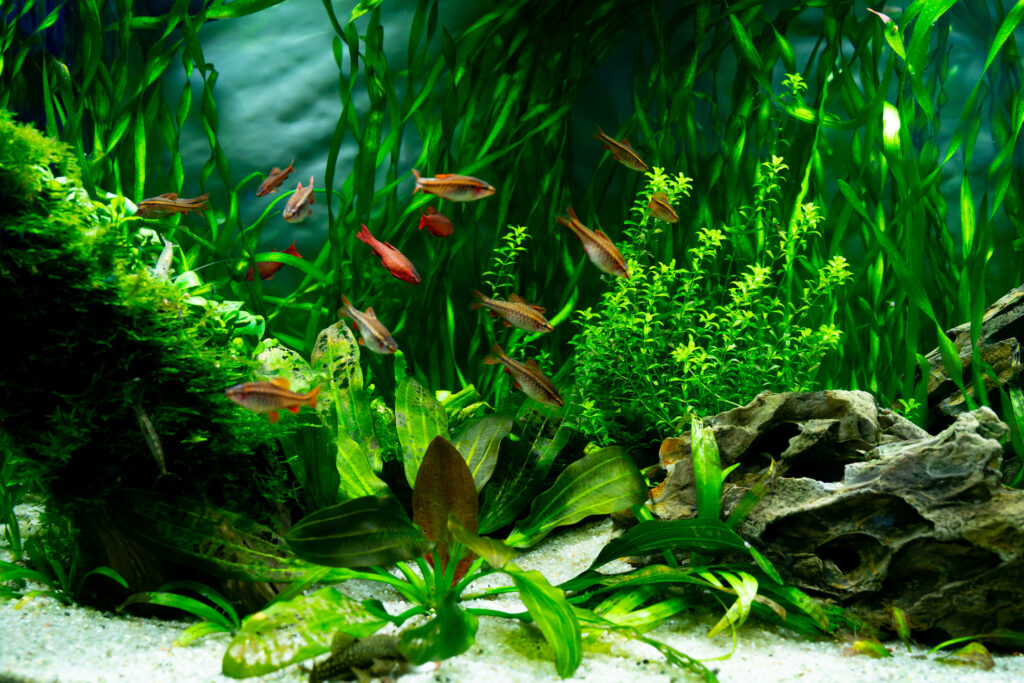Does your fish tank stink? A foul aquarium smell is a problem that you need to address immediately. The good news is that the problem causing the odor is usually pretty simple to fix and prevent.
Read this guide to determine what causes fish tank odors and how to fix and prevent them.
Is A Stinky Fish Tank Normal?
You should not walk into the same room as your aquarium and notice any smell coming from the tank.
Although fish tanks do have an odor most of the time, the smell should be relatively pleasant. Freshwater tanks should have an earthy smell like freshly dug soil in your garden, and a saltwater tank should have a slight ocean scent reminiscent of a trip to the beach. However, you have a problem if your fish tank stinks like rotten eggs or blocked drains!
What Causes Fish Tank Odors?
So, the first thing you need to do is find out what’s causing the bad odor.
A Dead Fish
Unfortunately, the most common cause of a smelly fish tank is a deceased aquarium invertebrate or fish. Even a tiny tetra can cause a revolting stench as the corpse rots, filling the whole room with a vile stench.
It can be difficult to locate the dead fish or shrimp in a busy tank with lots of fish, decorations, and dense planting. Some fish species are very shy, hiding away in caves for much of the time, and there are nocturnal types to bear in mind, too.
Once a week, you should conduct a fish review, checking that all your pets are present and correct. Even that can be a challenge in a big tank with many residents, but it’s worth doing.
If you discover that a fish is missing, look carefully in all the usual hiding places, among plant leaves, and inside the pump housing of internal filter systems. Shrimp and snails often find their way inside filter outflow pipes, and quickly cause a stink if they die inside.
Look Further Afield
Of course, if you don’t have a lid or cover slide on your fish tank, one of your pets may have escaped, leaping out of the aquarium to its doom on the living room carpet.
Accomplished jumpers, such as Killifish and bettas, should always be kept in a tank with some kind of cover. Check the back of the tank cabinet and any nearby furniture to ensure nothing is rotting there.
Luckily, curing the smell made by a dead fish carcass in the tank is relatively simple. Simply remove the deceased fish, and the odor will soon disappear.
Preventing Odors Caused By Dead Fish
You can’t prevent your fish from dying once their reach the end of their natural lifespan. However, you can ensure that your fish have a long, healthy life by keeping their aquarium water clean and well-maintained, not overcrowding the tank, feeding the fish a high-quality, correct diet, and not overfeeding them.
Overfeeding Your Fish
Overfeeding your fish also causes a foul odor to come from your fish tank.
How?
Well, even greedy fish, such as goldfish, can only eat a certain amount of fish food in one session. Any food that the fish don’t eat simply drops to the bottom of the tank, where it quickly starts to decompose. As the food rots, it releases gases like ammonia, which cause a rank odor. The stink gets worse and worse as the uneaten food accumulates.
The cure to that problem is easy. Use a gravel vacuum to clean your dirty substrate at least once weekly to remove decomposing organic matter and carry out partial water changes.
Preventing Odors Caused By Overfeeding
Foul smells caused by overfeeding are incredibly easy to prevent. Rather than offering your fish one huge feed daily, give the fish what they will clear in just a few minutes. That way, there won’t be a pile of leftover food to produce bad smells.
Fish Waste
Excessive amounts of fish waste can also be responsible for causing a horrible smell. If you have too many fish in your aquarium, the waste they generate can quickly accumulate and break down, causing a bad smell.
However, your weekly tank maintenance regimen will be sufficient to keep the tank clean and prevent unpleasant odors in a tank where the fish population is at the correct level.
Preventing Odors Caused By Fish Waste
This problem is easy to cure! Don’t overstock your aquarium; only keep fish suitable for your tank. Generally, overstocking is a problem for newbies to the hobby who don’t understand the basics of fishkeeping.
Very simply, the number of fish you can keep depends on the size of your tank and the water volume it contains. Generally, you want to allow one gallon of water per inch of fish. However, some dirty species, such as goldfish, need a greater water volume, and territorial, semi-aggressive types need more space to prevent disputes with other fish.
If you’re unsure how much space your preferred fish species needs, ask for guidance in your local fish store. You might have to upgrade to a larger tank or give some of your fish away to a friend.
Dead Plants
Although not the worst culprit, a dead plant can be surprisingly smelly if it’s not removed.
An aquarium plant generally turns brown or assumes a nasty, slimy black color as decomposition progresses. You need to remove any dead or damaged plants and plant leaves immediately as they will damage your fish tank water quality.
Algae can also rot, causing a very unpleasant smelly tank. If you are unfortunate enough to have blue-green algae in your tank, that can be especially malodorous.
Preventing Odors Caused By Dead Plants
The easiest way to prevent your living plants from causing an unpleasant odor is to keep them healthy and thriving.
Choose species that are easy to grow, and be sure to provide the plants with plenty of light and nutrients. Every week, trim away dead or damaged leaves and broken stems, and thin out the plants periodically to nip those nasty odors in the bud!
You might want to keep a clean-up crew in your aquarium, such as snails and shrimp. These creatures will happily munch on algae, helping to keep overgrowth to a minimum and eating decomposing plant matter.
Filthy Filter
Ideally, your filtration system removes solid waste particles from the water and circulates the total volume of water in your aquarium through the filter media at least four times every hour. The filter media contains beneficial colonies of bacteria that process organic waste, cleaning the water and making it safe for your fish.
Of course, everything trapped in the filter media is a potential odor-creator, from a dead leaf to leftover fish flakes to fish waste. The sludge that trapped material creates in the media quickly gives off a foul odor that will eventually permeate your room.
Preventing Odors Caused By Your Aquarium Filter
Bottom line – Keeping up to date with regular filter maintenance and tank cleaning duties should eliminate odors in your fish tank.
Every week, carry out a partial water change and rinse the filter media in dirty tank water to preserve the beneficial bacteria that live there. When the media is spent, replace it right away. That should eliminate most of the smelly sludge that would otherwise cause an odor.
Smelly Substrate
If the stench coming from your fish tank has an aroma of rotten eggs, that’s bound to be caused by sulfur. A sulfurous odor is usually caused by pockets of foul air trapped in the substrate. The problem occurs when organic waste gets trapped in small pockets or dead spots in the gravel. Environmental bacteria proliferate in the waste, converting it to gases that stink!
The gas then works its way up through the water to create a foul rotten egg smell in your living room.
Dead spots are also potentially fatal for your fish. If the fish swim over the gas pocket, there’s a chance your pet could be poisoned by the toxic gases emanating from the waste.
Preventing Dead Spots In The Substrate
You can easily prevent dead spots from forming by using an aquarium vacuum cleaner once a week when cleaning your fish tank. Use the vacuum to get deep down into the substrate, stirring the gravel or sand to prevent gas pockets from forming.
You must also ensure that your filtration system is powerful enough to circulate the fish tank water throughout your aquarium and through the filter media. If the filter current is not powerful enough or is misdirected, dead spots can quickly develop, especially in the tank corners.
Water Treatments
Water treatments and conditioners can also be responsible for nasty fish tank smells.
Some water conditioner products give off an aroma like rotten eggs when you open the cap on the bottle. However, once you add the product to your fish tank, the smell should quickly disappear.
Preventing Smells Caused By Water Treatments
The easiest way to prevent water treatments from causing a nasty aroma in your fish tank is to avoid using any product that contains sulfur.
How To Keep Your Fish Tank Smelling Sweet

A healthy fish tank doesn’t smell of anything except perhaps a freshly turned earthy aroma.
If your aquarium smells bad, the problem is most likely due to one of the common reasons outlined above. We believe that prevention is better than cure, so in this part of our guide, we’ll talk about removing bad smells from your fish tank and creating a healthy environment for your fish.
Of course, you need to be sure of the cause of the foul smell before you can cure it! Do some detective work, and once you figure out the cause of the problem, you can fix it and prevent the issue from happening again.
Maintain Your Aquarium Properly
Assuming you don’t have a dead fish stinking up your tank, you’ll need to clean the aquarium thoroughly. Remove anything that’s decomposing or rotting from the tank, as that’s guaranteed to cause the smell.
- Start by carrying out a 30% partial water change.
- Wipe down the glass with an algae sponge or scraper to remove algae that could be causing the odor.
- Use an aquarium vacuum cleaner to clean the substrate thoroughly. Focus on areas on the bottom of the tank, including around the bases of plant stems and decorations. Push the vacuum cleaner right underneath internal filter boxes and deep into the substrate in the tank corners, as that’s another common place for waste to accumulate.
- Take time out to clean rocks and decorations of algae and loose waste.
- Prune any dead leaves off your plants and remove dead or broken stems.
- Remove the filtration unit and disassemble it. Rinse the filter media thoroughly to get rid of any sludge and replace the media in the filter.
- Clean the filter unit and pump to get rid of any sludge.
If you’ve neglected your tank maintenance duties, you might find that your tank will smell even worse when you first clean it and add fresh water.
Perform Daily Water Changes
Over the next few days, carry out 10% to 15% water changes. That will add clean, odorless water to your aquarium while simultaneously removing the foul-smelling water and any unpleasant fishy smell.
Use A Carbon Filter
Adding a carbon filter to your setup can produce fabulous results, soaking up bad smells like a sponge and making your water crystal clear as a bonus.
The main downside of using carbon filters is that they need to be replaced fairly regularly, ideally once a month. That’s because once the carbon is “full,” the smell will come back.
Final Thoughts
If your fish tank develops a foul odor, it could be caused by several factors, including a dead fish, dirty biological filters, dead spots in the substrate, and decaying organic matter in the tank.
Aquarium owners can prevent unpleasant smells from developing by keeping on top of routine tank cleaning and maintenance. Also, carry out a weekly headcount on your fish and other livestock to ensure that none are missing.
Did you have a stinky fish tank? How did you cure it? Tell us in the comments box below!












